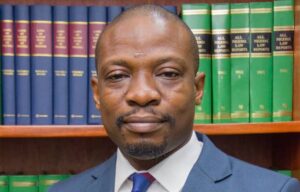Enough is Enough (EIE) Nigeria has filed a N5 billion claim at the Federal High Court in Lagos against four mobile telecommunications operators in Nigeria over their blocking of access to Twitter, in a class action by the non-governmental organization on behalf of the companies’ subscribers, including Paradigm Initiative (PIN) and Media Rights Agenda (MRA).
Named as Respondents in the suit are MTN Nigeria Communications Plc, Airtel Networks Limited, Globacom Limited, and Emerging Markets Telecommunication Services Limited, which trades as “9 Mobile”.
The suit was initiated by the law firm of Olumide Babalola by “Originating Summons” brought pursuant to Section 39 of the 1999 Constitution, as amended; Order II Rules 1 to 5 of the Fundamental Rights (Enforcement Procedure) Rules, 2009; and Article 9 of the African Charter on Human and Peoples’ Rights (Ratification and Enforcement) Act, Cap A9, Laws of the Federation of Nigeria, 2004.
EIE is asking the Court to determine whether or not by the interpretation of Section 39 of the 1999 Constitution, as amended, owning and accessing one’s Twitter account is an exercise of the right to freedom of expression as guaranteed by the Section and whether the blocking of EIE’s and the other subscribers’ access to the Twitter application software by the telecommunications companies interfered with the subscribers’ freedom of expression.
The organization also wants to court to decide whether it is not entitled to the reliefs it is claiming, namely:
- A declaration that the telecommunications companies blockage of access to the Twitter application software for EIE and the subscribers it represents interfered with their freedom of expression and the press guaranteed by Section 39 of the Constitution;
- A declaration that EIE and the subscribers it represents are entitled to compensation and damages for the unlawful and unconstitutional violation of their fundamental right to freedom of expression and the right to receive and impart information through any medium of their choice as guaranteed under Section 39 of the Constitution and Article 9 of the African Charter on Human and Peoples’ Rights (Ratification and Enforcement) Act. Cap A9, Laws of the Federation of Nigeria, 2004;
- An order of perpetual injunction restraining the telecommunications companies, their servants and agents from unlawful imposition of restrictions or blocking on Twitter or in any other manner that will prevent EIE’s use of Twitter or any other social media platform thereby infringing on or interfering with the organization’s fundamental rights as guaranteed by the 1999 Constitution and Article 9 of the African Charter;
- General damages of N5 billion, and any consequential orders that the court may deem fit to make in the circumstance.
In a 24-paragraph supporting affidavit, Mr. Seun Akinyemi, EIE’s research assistant, deposed that on June 5, 2021, the four telecommunications operators blocked access to Twitter for the organization and the subscribers it represents when it had no legal grounds to do so as no law empowers them to do so. He added that the violation of the rights of EIE and those subscribers that it represents was still ongoing.
He said by blocking access to Twitter, the telecommunications companies precluded EIE and those it represents from the dissemination of information, ideas and opinions.
According to Mr. Akinyemi, EIE has about 271,000 followers on Twitter while it follows 982 accounts on the same platform and use it to disseminate information to its over 271,000 followers.
He added the MRA has about 10,300 followers and follows 94 accounts on Twitter while PIN has about 18,500 followers and follows 469 accounts.
Mr. Akinyemi said the instructions to the telecommunications companies to block access to Twitter came from a mere letter but not under a law that empowers such an order.
In a written address filed in support of the suit by Ms Chioma Nwaodike and Mr. Precious Okoh, they cited the decision of the Court of Appeal in Abdulkareem v. LSG (2016) All FWLR (Pt. 850), 101 where the Court of Appeal held that “fundamental human rights are not ordinary rights. They are elevated rights, some of them have their origin in international conventions or treaties. They are a special class of rights and no person shall be deprived of the enjoyment of any such rights except by the proper observance of the due process of law.”
They argued that the import of the Court of Appeal’s decision is that fundamental human rights can only be limited or restricted by applicable statutory provision, which in this case, is the provision of the 1999 Constitution.
Citing Section 45 of the Constitution, the lawyers contended that any restriction on the right to freedom of expression, which includes the right to own and operate Twitter application software, must be made by law and must be reasonably justifiable in a democratic society.
They insisted that although Section 45(1)(a) of the Constitution expressly preserves laws made in the interest of defence, public safety, public order, public morality or public health, the telecommunications companies have not pointed to the part of the provisions that they are relying on in blocking access to Twitter.
Referring to Order 1, Rule 2 of the Fundamental Rights (Enforcement Procedure) Rules, 2009, the lawyers noted that it defines an applicant as “A party who files an application or on whose behalf an application is filed under the Rules.”
They argued that the definition is reinforced by the provisions of Section 3€ of the Preamble to the Fundamental Rights (Enforcement Procedure) Rules, which states that “The court shall encourage and welcome public interest litigations in the human rights field and no human rights case may be dismissed or struck out for want of locus standi. In particular, human rights advocates or groups as well as any non-governmental organization, may institute human rights applications on behalf of any potential applicant.”
No date has been fixed for the hearing.







